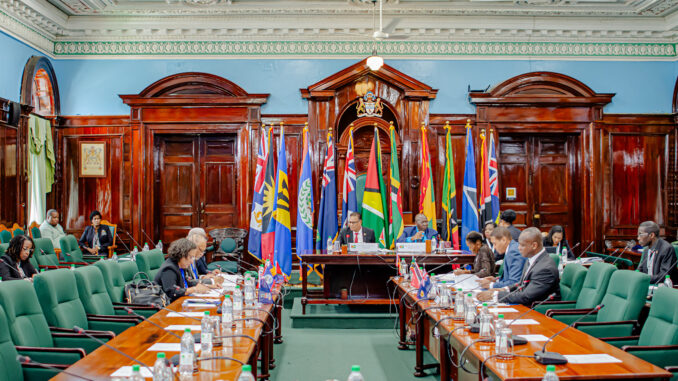
Inaugurated by the Guyana House of Assembly, the Guyana Head of State.
Guyana’s head of state being impeached by the National Assembly would represent a historic and politically significant event. While such a scenario is hypothetical as of now, the framework for such proceedings can be examined based on Guyana’s Constitution, political environment, and the broader implications for governance.
Background: The Political System of Guyana
Guyana operates under a republican parliamentary democracy, with the President serving as both the Head of State and Head of Government. The President is indirectly elected by the people through the party that wins the majority in the National Assembly. The National Assembly is the legislative body of Guyana, responsible for creating laws and holding the executive accountable.
The Constitution of Guyana provides the legal framework for the removal of a President, though the process is complex and requires substantial political will. This ensures that impeachment is reserved for serious breaches of the law or constitutional violations.
Grounds for Impeachment
For the President to be impeached, specific grounds would need to be established. These could include:
- Violation of the Constitution: The President is sworn to uphold and protect the Constitution. Any action that blatantly contravenes its provisions could justify impeachment.
- Misconduct or Corruption: If the President engages in acts of corruption, abuse of power, or other forms of misconduct that undermine public trust.
- Incapacity: Mental or physical incapacity preventing the President from carrying out their duties.
- Criminal Activity: Involvement in illegal activities, such as embezzlement of state funds or other serious crimes.
Impeachment Process
- Initiation: A motion for impeachment must first be introduced in the National Assembly. This requires substantial evidence and the support of a significant number of Members of Parliament (MPs).
- Investigation: A parliamentary committee or independent body would likely investigate the allegations to determine their validity.
- Debate and Vote: Once the investigation is complete, the findings would be debated in the National Assembly. A supermajority vote (e.g., two-thirds of MPs) is typically required to proceed with impeachment.
- Removal: If the motion passes, the President is formally removed from office, and the position is temporarily filled according to constitutional provisions, often by the Prime Minister or another designated official.
Implications of Impeachment
- Political Stability: Impeachment is a divisive process and could lead to political unrest, particularly in a polarized society. It might also necessitate early elections.
- Public Confidence: Successfully holding a President accountable can strengthen democratic institutions and restore public trust, but a failure to prove allegations could damage confidence in governance.
- Regional and International Impact: Guyana’s geopolitical importance, especially given its oil wealth and strategic location, means that such an event would attract global attention. Investors and international partners would monitor the situation closely.

Challenges in Impeachment
The process of impeaching a head of state is fraught with challenges. It requires substantial evidence, political unity, and adherence to legal standards. In Guyana’s context, political tensions between the main parties, the People’s Progressive Party (PPP) and the People’s National Congress (PNC), could complicate proceedings.
Hypothetical Scenario Analysis
Should a head of state in Guyana face impeachment, it would likely be in response to an extraordinary event or controversy. For example, allegations of corruption related to oil revenues, abuse of power, or failure to address constitutional breaches could trigger such proceedings. The outcome would depend on the unity and resolve of the National Assembly and the ability of the judiciary to ensure a fair process.
In conclusion, while impeachment of Guyana’s head of state is theoretically possible, it would be a rare and extraordinary event requiring substantial evidence, political consensus, and adherence to constitutional processes. Such an event would not only shape the future of governance in Guyana but also set a precedent for accountability in the nation’s highest office.
Leave a Reply